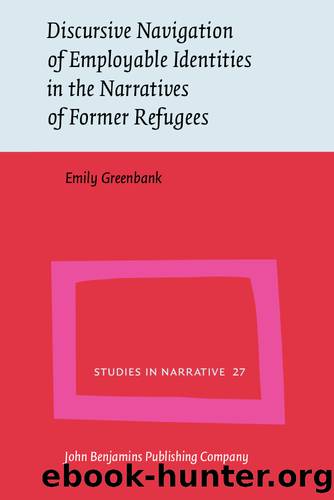Discursive Navigation of Employable Identities in the Narratives of Former Refugees by Greenbank Emily;

Author:Greenbank, Emily; [Greenbank, Emily]
Language: eng
Format: epub
Publisher: John Benjamins Publishing Company
Published: 2020-05-29T13:09:18+00:00
Kelly narrates a storyworld in which she is alone, and bombarded, via phone and email, with rejections. The vital importance to her of the emotional support of her former (job centre) network is made clear in the way that she repeats four times, in an emotionally-charged tone, the feedback that every phone call and email contained: you donât have experience (lines 3 and 4). Through this repetition Kelly discursively embodies her re-enactment of the bombardment and emphasises the draining effect of the constant reminder of her lack of embodied capital. This is then reemphasised by an estimate of fifteen rejections that she received without social support to help her process them; this led to Kelly-as-protagonist questioning her resolve to continue applying for jobs (line 6). Here, as often, Kelly-as-narrator laughs in a non-humorous context, suggesting an attempt to save face in a demoralising storyworld situation (cf. Ladegaard, 2013; Warner-Garcia, 2014).
Kelly told me that this was the point at which she decided to stop applying for jobs, after a year of doing so, and direct her energies towards volunteer work where, although not receiving financial compensation, she felt that her skills were being put to use. Without a social network to provide emotional support, Kelly indicates that her investment in, and resolve to, continue attempting to successfully negotiate an employable identity in the labour market were severely impacted. Receiving only negative feedback, she appears to have been unable to maintain belief in her own capital and employability.
Kellyâs lack of social capital seems to have restricted her ability to project success in the future. Access to social capital can have the opposite effect. We have seen that (non)recognition of cultural capital can affect former refugeesâ sense of self (Excerpt 7.4, above). Social capital, too, is important for both resilience and the ways in which former refugee jobseekers can envisage their futures, that is, their imagined identities (Norton, 2001). The significance of Isaacâs social capital to his imagined identity can be seen in the excerpt below. While Isaac was still studying, he and I discussed what careers he might like to pursue after graduating. He floated the ideas of continuing to work for the union he had part-time employment with at the time, and returning to Africa to help others as he had been helped in the past, before arriving at the idea of entering local politics:
Excerpt 7.8
30 March 2016; 47.19â47.44
1. Isaac: also I donât know the local politics kind of + looks fun [laughs] 2. Emily: yeah 3. Isaac: ah people cause I always associated myself with the Labour Party + 4. and + I do a lot of campaigning when whenever I have the time 5. for local politicians starting from my our MP [local MP name] and 6. Emily: mmhm 7. Isaac: councillors like [local councillor name] + so I donât know in the long term 8. that could be maybe + local + yeah + council
Download
This site does not store any files on its server. We only index and link to content provided by other sites. Please contact the content providers to delete copyright contents if any and email us, we'll remove relevant links or contents immediately.
Cecilia; Or, Memoirs of an Heiress — Volume 1 by Fanny Burney(32234)
Cecilia; Or, Memoirs of an Heiress — Volume 3 by Fanny Burney(31619)
Cecilia; Or, Memoirs of an Heiress — Volume 2 by Fanny Burney(31585)
The Lost Art of Listening by Michael P. Nichols(7298)
Asking the Right Questions: A Guide to Critical Thinking by M. Neil Browne & Stuart M. Keeley(5509)
We Need to Talk by Celeste Headlee(5453)
On Writing A Memoir of the Craft by Stephen King(4763)
Dialogue by Robert McKee(4225)
Pre-Suasion: A Revolutionary Way to Influence and Persuade by Robert Cialdini(4046)
I Have Something to Say: Mastering the Art of Public Speaking in an Age of Disconnection by John Bowe(3795)
Elements of Style 2017 by Richard De A'Morelli(3259)
The Book of Human Emotions by Tiffany Watt Smith(3174)
Fluent Forever: How to Learn Any Language Fast and Never Forget It by Gabriel Wyner(2952)
Name Book, The: Over 10,000 Names--Their Meanings, Origins, and Spiritual Significance by Astoria Dorothy(2888)
Good Humor, Bad Taste: A Sociology of the Joke by Kuipers Giselinde(2838)
Why I Write by George Orwell(2814)
The Grammaring Guide to English Grammar with Exercises by Péter Simon(2662)
The Art Of Deception by Kevin Mitnick(2641)
Ancient Worlds by Michael Scott(2547)
